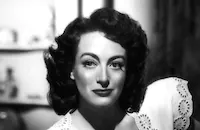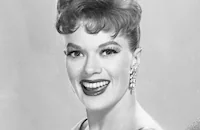The Caretakers

Brief Synopsis
Cast & Crew
Hall Bartlett
Robert Stack
Polly Bergen
Joan Crawford
Janis Paige
Diane Mcbain
Film Details
Technical Specs

Synopsis
Following the death of her small son in an automobile accident, Lorna Melford suffers a nervous collapse and is confined in a mental institution. Despite her homicidal tendencies, Dr. Donovan MacLeod decides that Lorna is a "borderline case" and places her in a group therapy ward where the patients are given considerable freedom. The group includes also the nymphomaniac Marion; Connie, who hears imaginary voices; Anna, who saw her parents killed in wartime; senile Irene; and Edna, mute and a pyromaniac. Lucretia Terry, the hospital's head nurse, who advocates the use of force in handling the patients, strongly opposes MacLeod's methods. He is almost discredited when Marion steals some alcohol and stages a wild party that ends in brawling and fighting. Lucretia brings charges against him and tries to have him replaced, but the hospital's board of directors gives him a little more time to justify his theories. The crucial moment arrives when Edna, with a torch she has made, attempts to set fire to the group therapy ward. The strong-arm methods of Lucretia's nurses fail to subdue the girl, but Lorna soothingly induces Edna to give up her torch and to speak the first word she has uttered in years. Lorna's apparent cure prompts the hospital board to grant MacLeod permission to open a day clinic for borderline cases.

Director
Hall Bartlett
Cast

Robert Stack

Polly Bergen

Joan Crawford

Janis Paige

Diane Mcbain
Van Williams
Constance Ford
Sharon Hugueny

Herbert Marshall
Ana St. Clair
Barbara Barrie

Robert Vaughn

Susan Oliver

Ellen Corby
Crew
Lucien Ballard
Hall Bartlett
Hall Bartlett
Hall Bartlett
Elmer Bernstein
Irving Block
Rolland M. Brooks
Haile Chace
Don Christie
Tom Coleman
Ed Cronenweth
Frank Delmar
Joe Demartini
George Elliott
Sydney M. Fogel
Ed Garvin
Jim Gibbs
Winifred Gibson
Henry F. Greenberg
Claudio Guzman
Ed Hammers
Ann Helfgott
Nat James
James Mathews
William B. Murphy
Jerry Paris
Jerry Paris
Frank Prehoda
Jeanne Reddeman
George Satterfield
Tom Thompson
Frank [a.] Tuttle
Ken Wesson
Pat Westmore

Videos
Movie Clip


Hosted Intro
Film Details
Technical Specs

Award Nominations
Best Cinematography
Articles
The Caretakers
Author/critic Susan Sontag once classified camp as failed seriousness and that's a perfect description of The Caretakers, produced and directed by Hall Bartlett. While it might lack the full-throttle looniness of say....Beyond the Forest (1949) or Johnny Guitar (1954), it still has enough jaw-dropping moments to compensate for its occasional dull spots. One of the most memorable moments occurs at the beginning when Lorna freaks out in a crowded movie theatre showing West Side Story. She runs up in front of the huge screen and has a massive mental breakdown while newsreel footage of crashing racecars unspools behind her. How often do we get to see an added attraction like that at the local multiplex?
Since Ms. Bergen is the real star of the picture, she gets to do most of the emoting. There's the obligatory shock treatment scene, a disastrous visit with her patient but uncomprehending husband (Robert Vaughn) and, best of all, a creepy scene where she takes a wrong turn in the hospital at night and winds up in the men's ward. For a brief moment, you'll think you're watching Sam Fuller's Shock Corridor (1963) as the sex-starved, possibly homicidal male patients advance on the hapless Lorna.
In her book, Polly's Principles, Ms. Bergen discussed her preparation for the role of Lorna: "To play her realistically, I had to seek out all the facets in myself that frightened me most, or that I was most ashamed of, and bring them out in the open to use. I checked into the psychiatric ward of the California State Hospital at Camarillo for a few days, to study the women there." She became so engrossed in her character that "the woman became an integral part of me. Or I became submerged in her. I don't know which, our identities became so confused in my mind. And I learned, in the course of the film, that the line between sanity and insanity is terribly narrow, and depends on emotional stability or the lack of it. When I finished The Caretakers, I was a basket case." Unfortunately, Ms. Bergen's performance is all tics and tantrums. It's the type of overwrought acting that perpetuates stereotypes about the mentally ill. While she's often unintentionally funny, the actress has done much better work in other films, particularly her role as Gregory Peck's terrified wife in Cape Fear (1962).
The real scene-stealers in The Caretakers are Janis Paige, who delivers a non-stop stream of sarcastic wisecracks as if she's an escapee from a screwball comedy, and Joan Crawford, acting with grand seriousness. Notice the way Joan is lit throughout the movie. Bar-like shadows fall across her features no matter what room she is in, even though her co-stars are lit in full light. The whole effect is rather disconcerting but, strangely enough, Lucien Ballard's cinematography was nominated for an Oscar.
In Joan Crawford by Bob Thomas, the biographer wrote that when Crawford "arrived on the set for the first time, the film workers applauded. Joan threw up her arms and proclaimed: "It's so wonderful to be back! You're my life!" Thomas also wrote that "Joan spent little time with the younger members of the cast, especially Polly Bergen, who had been a star of Pepsi-Cola television and a protégée of Alfred Steele [Joan's fourth husband]. But Joan had compassion for Herbert Marshall, who represented the Old Hollywood to her. He was desperately sick and drinking heavily, and Joan helped him through their scenes together. She had requested Bartlett to film her close-ups first - "My whole career has been built on close-ups" - but in her scenes with Marshall she asked the director to shoot his close-ups before hers."
As usual, Ms. Crawford had some strong opinions about her role. In Bette and Joan: The Divine Feud, author Shaun Considine wrote that the actress originally had "her own mad scene, though it was cut from the final picture. "I was changed from a cameo part to just an angry woman," said Joan. "The director's excuse was that some of my scenes made me look cheap. But every woman who's rejected by the man she loves looks cheap. I should know, I'm a woman." She's also one heck of a nurse. If you have any doubts, just check out that brief scene in The Caretakers where, clad in a skintight black judo outfit, she tosses the much heavier Constance Ford over her shoulder.
Producer/Director: Hall Bartlett
Screenplay: Hall Bartlett, Henry Greenberg, based on the novel by Dariel Telfer
Art Direction: Rolland M. Brooks, Claudio Guzman Cinematography: Lucien Ballard
Film Editing: William B. Murphy
Original Music: Elmer Bernstein
Cast: Robert Stack (Dr. Donovan MacLeod), Polly Bergen (Lorna Melford), Joan Crawford (Lucretia Terry), Susan Oliver (Nurse Cathy Clark), Janis Paige (Marion), Diane McBain (Alison Horne), Van Williams (Dr. Larry Denning), Constance Ford (Nurse Bracken), Sharon Hugueny (Connie), Herbert Marshall (Dr. Jubal Harrington), Barbara Barrie (Edna), Ellen Corby (Irene), Robert Vaughn (Jim Melford).
BW-99m. Letterboxed.
by Jeff Stafford

The Caretakers
Robert Stack, 1919-2003
Stack was born in Los Angeles on January 13, 1919 to a well-to-do family but his parents divorced when he was a year old. At age three, he moved with his mother to Paris, where she studied singing. They returned to Los Angeles when he was seven, by then French was his native language and was not taught English until he started schooling.
Naturally athletic, Stack was still in high school when he became a national skeet-shooting champion and top-flight polo player. He soon was giving lessons on shooting to such top Hollywood luminaries as Clark Gable and Carol Lombard, and found himself on the polo field with some notable movie moguls like Darryl Zanuck and Walter Wanger.
Stack enrolled in the University of Southern California, where he took some drama courses, and was on the Polo team, but it wasn't long before some influential people in the film industry took notice of his classic good looks, and lithe physique. Soon, his Hollywood connections got him on a film set at Paramount, a screen test, and eventually, his first lead in a picture, opposite Deanna Durbin in First Love (1939). Although he was only 20, Stack's natural delivery and boyish charm made him a natural for the screen.
His range grew with some meatier parts in the next few years, especially noteworthy were his roles as the young Nazi sympathizer in Frank Borzage's chilling The Mortal Storm (1940), with James Stewart, and as the Polish flier who woos a married Carole Lombard in Ernst Lubitsch's To Be or Not to Be (1942).
After serving as a gunnery officer in the Navy during World War II, Stack returned to the screen, and found a few interesting roles over the next ten years: giving Elizabeth Taylor her first screen kiss in Robert Thorp's A Date With Judy (1948); the leading role as an American bullfighter in Budd Boetticher's The Bullfighter and the Lady (1951); and as a pilot in William Wellman's The High and the Mighty (1954), starring John Wayne. However, Stack saved his best dramatic performances for Douglas Sirk in two knockout films: as a self-destructive alcoholic in Douglas Sirk's Written on the Wind (1956), for which he received an Academy Award nomination for supporting actor; and sympathetically portraying a fallen World War I pilot ace who is forced to do barnstorming stunts for mere survival in Tarnished Angels (1958).
Despite proving his capabilities as a solid actor in these roles, front rank stardom oddly eluded Stack at this point. That all changed when Stack gave television a try. The result was the enormously popular series, The Untouchables (1959-63). This exciting crime show about the real-life Prohibition-era crime-fighter Eliot Ness and his G-men taking on the Chicago underworld was successful in its day for several reasons: its catchy theme music, florid violence (which caused quite a sensation in its day), taut narration by Walter Winchell, and of course, Stack's trademark staccato delivery and strong presence. It all proved so popular that the series ran for four years, earned an Emmy for Stack in 1960, and made him a household name.
Stack would return to television in the late '60s, with the The Name of the Game (1968-71), and a string of made-for-television movies throughout the '70s. His career perked up again when Steven Spielberg cast him in his big budget comedy 1941 (1979) as General Joe Stillwell. The film surprised many viewers as few realized Stack was willing to spoof his granite-faced stoicism, but it won him over many new fans, and his dead-pan intensity would be used to perfect comic effect the following year as Captain Rex Kramer (who can forget the sight of him beating up Hare Krishnas at the airport?) in David and Jerry Zucker's wonderful spoof of disaster flicks, Airplane! (1980).
Stack's activity would be sporadic throughout the remainder of his career, but he returned to television, as the host of enormously popular Unsolved Mysteries (1987-2002), and played himself in Lawrence Kasden's comedy-drama Mumford (1999). He is survived by his wife of 47 years, Rosemarie Bowe Stack, a former actress, and two children, Elizabeth and Charles, both of Los Angeles.
by Michael T. Toole
Robert Stack, 1919-2003
Quotes
Trivia
Miscellaneous Notes
Released in United States 1963
Released in United States 1963














